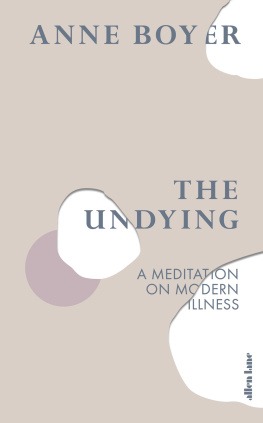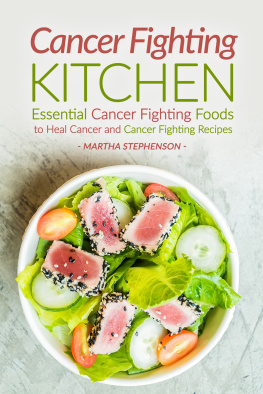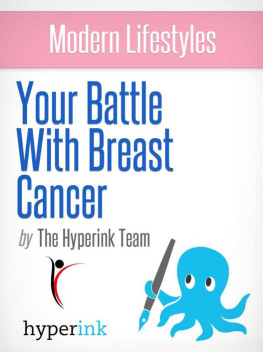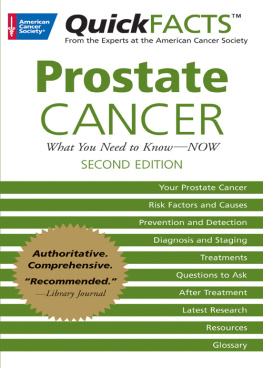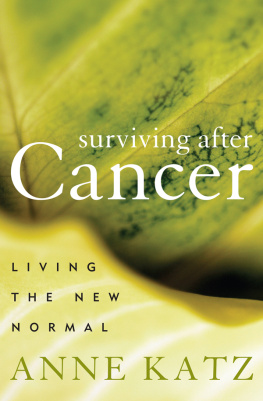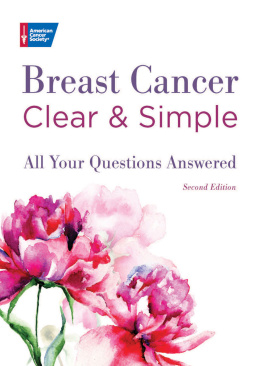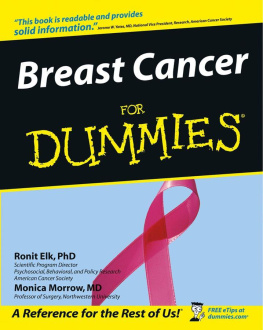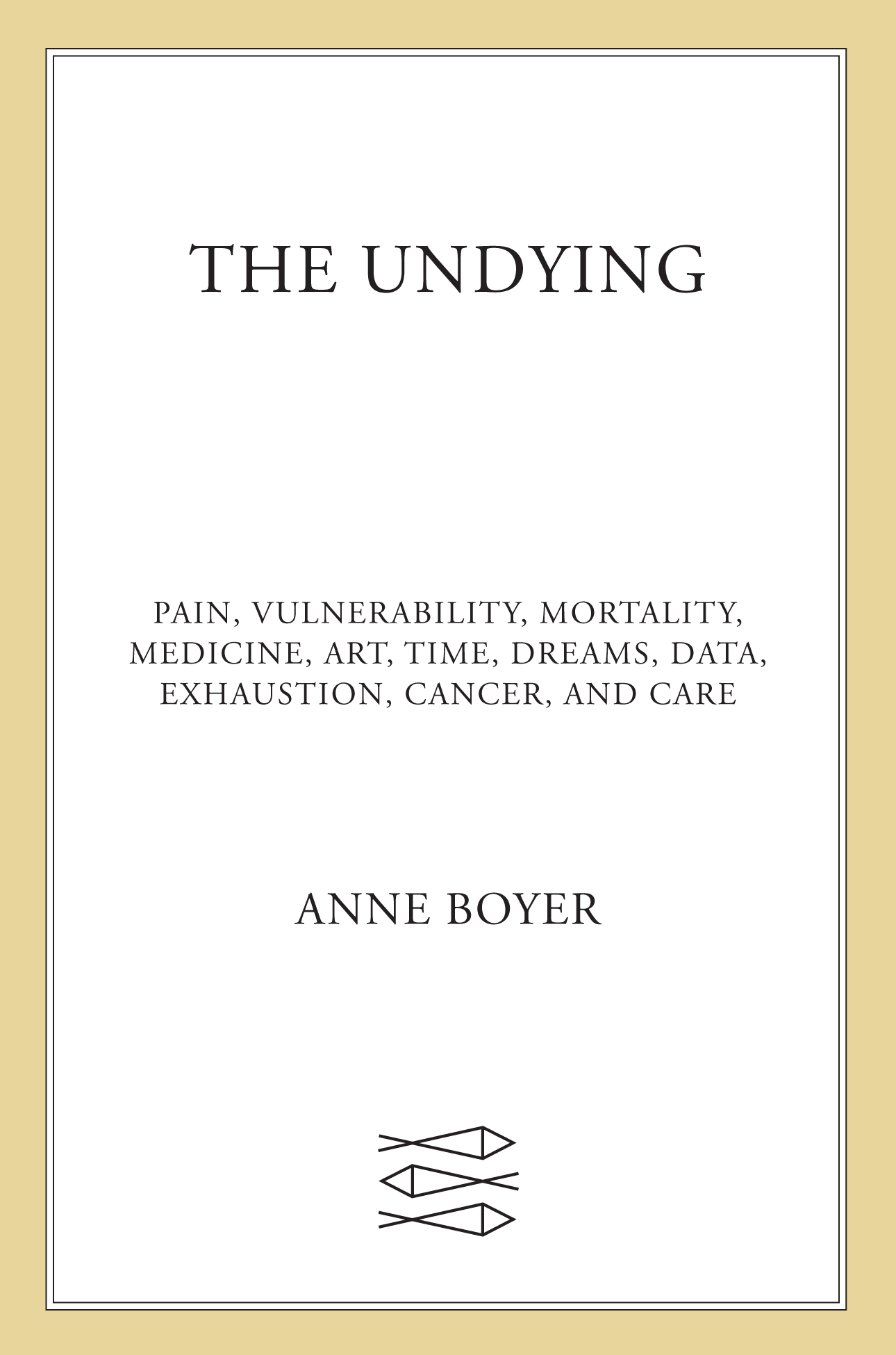The author and publisher have provided this e-book to you for your personal use only. You may not make this e-book publicly available in any way. Copyright infringement is against the law. If you believe the copy of this e-book you are reading infringes on the authors copyright, please notify the publisher at: us.macmillanusa.com/piracy.
Not even if I had ten tongues and ten mouths.
In 1972, Susan Sontag was planning a work to be called On Women Dying or Deaths of Women or How Women Die. In her journal under the heading material, she wrote a list of eleven deaths, including the death of Virginia Woolf, the death of Marie Curie, the death of Jeanne dArc, the death of Rosa Luxemburg, and the death of Alice James.
Illness as Metaphor is cancer as nothing personal. Sontag does not write I and cancer in the same sentence. Rachel Carson is diagnosed with breast cancer in 1960, at the age of fifty-three, while in the process of writing Silent Spring, among the most important books in the cultural history of cancer. Carson does not speak publicly of the cancer from which she dies in 1964.
In Jacqueline Susanns 1966 novel Valley of the Dolls, a character named Jennifer, afraid of mastectomy, dies by intentional overdose after her breast cancer diagnosis. Jacqueline Susann, diagnosed at forty-four, dies of breast cancer in 1974, the year Sontag is diagnosed.
In 1978, the poet Audre Lorde is also diagnosed with breast cancer at the age of forty-four. Unlike Sontag, Lorde uses the words I and cancer together, and does this famously in The Cancer Journals, which includes an account of her diagnosis and treatment and a call to arms: I dont want this to be a record of grieving only. I dont want this to be a record only of tears. For Lorde, the crisis of breast cancer meant the warriors painstaking examination of yet another weapon. Lorde dies of breast cancer in 1992.
Like Lorde, the British novelist Fanny Burney, who discovers her breast cancer in 1810, writes a first-person account of her mastectomy. Her breast is removed without anesthetic. She is conscious for the mastectomys duration:
not for days, not for Weeks, but for Months I could not speak of this terrible business without nearly again going through it! I could not think of it with impunity! I was sick, I was disordered by a single questioneven now, 9 months after it is over, I have a head ache from going on with the account! & this miserable account
Write aphoristically, Sontag notes in her journal when contemplating how to write about cancer in Illness as Metaphor. Breast cancer exists uneasily with the I that might speak of this terrible business and give this miserable account. This I is sometimes annihilated by cancer, but sometimes preemptively annihilated by the person it represents, either by suicide or by an authorial stubbornness that does not permit I and cancer to be joined in one unit of thought:
[Redacted] is diagnosed with breast cancer in 2014, at the age of forty-one.
or
I am diagnosed with [redacted] in 2014, at the age of forty-one.
The novelist Kathy Acker is diagnosed with breast cancer in 1996, at the age of forty-nine. I am going to tell this story as I know it, begins The Gift of Disease, an uncharacteristically straightforward account she wrote about cancer for The Guardian: Even now, it is strange to me. I have no idea why I am telling it. I have never been sentimental. Perhaps just to say that it happened. Acker doesnt know why she would tell the story and yet she does: In April of last year, I was diagnosed as having breast cancer. Acker dies of it in 1997, within eighteen months of being diagnosed.
Although breast cancer can happen to anyone with breast tissue, women bear the substantial weight of its calamities. These calamities come to women with breast cancer by way of early death, painful death, disabling treatment, disabling late effects of treatments, loss of partners, income, and capacity, but the calamities also come via the social morass of the diseaseits class politics, gendered delimitations, and racialized distribution of death, its rotating scheme of confused instructions and brutal mystifications.
If few diseases are as calamitous to women in effects as breast cancer, there are even fewer as voluminous in their agonies. These agonies are not only about the disease itself, but about what is written about it, or not written about it, or whether or not to write about it, or how. Breast cancer is a disease that presents itself as a disordering question of form.
The answer to that question of form is often competing redactions and these redactions interpretations and corrections. For Lorde, a black lesbian feminist poet, the redaction is cancers, and the silence around the disease is an entrance to politics: My work is to inhabit the silences with which I have lived and fill them with myself until they have the sounds of brightest day and loudest thunder.
A fourth title Sontag proposed for her never-to-be-written piece was Women and Death. She claims, Women dont die for each other. There is no sororal death. But I think Sontag was wrong. A sororal death would not be women dying for each other: it is death in an alienated parallel. A sororal death would be women dying of being women. The queer theorist Eve Kosofsky Sedgwick, diagnosed with breast cancer in 1991, at the age of forty-one, wrote about breast cancer cultures startling, sometimes brutal impositions of gender. Sedgwick, at her diagnosis, wrote that she thought, Shit, now I guess I really must be a woman. Sedgwick died of breast cancer in 2009.
Women might not, as Sontag claimed, die for each other, but their deaths by breast cancer are not without sacrifice. At least in the age of awareness, that lucrative, pink-ribbon-wrapped alternative to cure, what we are told must be given up for the common good is not so much ones life as ones life story. The silence around breast cancer that Lorde once wrote into is now the din of breast cancers extraordinary production of language. In our time, the challenge is not to speak into the silence, but to learn to form a resistance to the often obliterating noise. Sontags and Carsons reluctance to link themselves to the disease has now become replaced with an obligation, for those women who have it, to always do so.
Though I might claim, as Acker did, to not be sentimental, this sentence joins myself and my breast cancer together inif not a sentimental storyat least an ideological one:
I was diagnosed with breast cancer in 2014, at the age of forty-one.
Breast cancers formal problem, then, is also political. An ideological story is always a story that I dont know why I would tell but still do. That sentence with its I and its breast cancer enters into an awareness that becomes a dangerous ubiquity. As Jain describes it, silence is no longer the greatest obstacle to finding a cure for breast cancer: cancers everywhereness drops into a sludge of nowhereness.
Only one class of people who have had breast cancer are regularly admitted to the pinkwashed landscape of awareness: those who have survived it. To those victors go the narrative spoils. To tell the story of ones own breast cancer is supposed to be to tell a story of surviving via neoliberal self-managementthe narrative is of the atomized individual done right, self-examined and mammogramed, of disease cured with compliance, 5K runs, organic green smoothies, and positive thought. As Ellen Leopold points out in her history of breast cancer,


